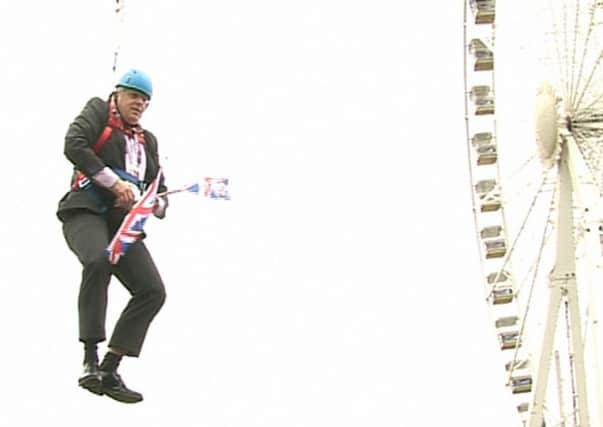Bill Jamieson: Clown army poses deadly serious threat to established order


Has there ever been a time such as this? Is any mainstream political party or leadership safe from the onward march of jokers, clowns and comic populists?
Consider the extraordinary triumph in Ukraine – a previously serious country - of the comedian Volodymyr Zelenskiy. He has just taken more than 70 per cent of the popular vote in a landslide victory. Even allowing for the bizarre particularities of Ukrainian politics, this is going some.
Advertisement
Hide AdAdvertisement
Hide AdMr Zelenskiy is an actor and comedian. He recently starred in a television show playing a teacher unexpectedly elected to the presidency. It is akin to Billy Connolly being swept to office as First Minister, or Frankie Boyle leading the SNP at Westminster (indeed, if they were contenders for these positions in a poll tomorrow, they might not fare at all badly).
The Ukraine result is far from exceptional. Around the world rank outsiders – populist figures with no experience of government – find themselves being swept into office. Donald Trump was well known as a businessman and TV show host before he entered the race for the US presidency. Few rated his chances at the time.
In Italy, Beppe Grillo, founder of the Five Star Movement, was a satirist and comic. His party is now in the ruling coalition. Outsiders are now in, and insiders on the way out.
The consensus explanation is that electorates are heartily sick of being promised actions and reforms by establishment politicians who subsequently fail to deliver. Social media has added mightily to the boiling bile of scorn and contempt. When all else fails, “send for the clowns” seems to be the populist response.
In a milder variant of these volcanic eruptions, the rank outsider Emmanuel Macron in France was swept into the presidency by virtue of being a non-establishment figure. And here in the UK, the political running on the Right is being made by Boris Johnson, widely regarded as a home-grown version of the Clown Tendency. Internal Conservative Party opinion polls put him firmly in the lead as the successor to Theresa May. His prospects are being buttressed by former Ukip leader Nigel Farage, the saloon-bar comeback kid whose Brexit party, now supported by Celebrity Big Brother contestant Anne Widdicombe, is set to sweep all before it across England and Wales in the European elections next month.
Anyone predicting all this three years ago would have been dismissed as a lunatic. But here we are. Can conventional mainstream politics recover? Or is it, as I believe, game over for the world as was?
Of all the current manifestations of populism, it is the UK that is arguably the least surprising and readily explicable. Three years of Brexit gridlock and the robotic utterances of Theresa May have worked to reduce large sections of the population to a state of catatonic exasperation. Within the normally ferociously loyal ranks of the Conservative party membership, rebellions are mounting and calls for change widely supported. This may be the UK’s oldest political party, well-practiced in the arts of recovery and re-invention. But the damage today looks beyond repair. Back in February, internal party polls already showed support for the Prime Minister at a miserable minus 41.8. But since then even these numbers have plunged off a cliff, collapsing to minus 73.5 this month. Pundits have scoured the archives and cannot find a worse rating accorded to any Conservative leader. By contrast, Boris Johnson has extended his poll lead over nearest rival Dominic Raab by seven percentage points to 46.19 per cent.
“Interesting but meaningless” may be the widespread response. Mrs May shows no sign of quitting. Mechanisms for her replacement have yet to be agreed. And there is a marked lack of appetite for contenders to come forward in the face of a likely annihilation for the party in the local and Euro elections. ‘Remain’ supporters are ruled out for the successorship. Equally, vocal Brexiteers would be unlikely to gain broad, middle-ground support. But ‘Boris’, Marmite though he may be in terms of appeal is a unique brand, with a distinctly populist touch that twice secured him victory in the London mayoral elections against earnest, hard-Left Labour opponents. In the wider context, changes in the political culture make a return to status quo ante unlikely. It is not just that voters wish to be rid of the all-too-familiar faces in the Conservative Cabinet.
Advertisement
Hide AdAdvertisement
Hide AdThey are susceptible to entertain easy-looking, bite-sized radical solutions that can seize the moment on Twitter and Facebook. Even reasoned campaigns for policies to combat climate change can fall victim to clown-like extremes. The rise of Extinction Rebellion is not a conventional political force but in its unrealistic and impractical demands has all the characteristics of a religious cult.
In the meantime, mainstream politicians, both here and across Europe, view the forthcoming Euro elections and the ascendancy of the populists with outright alarm.
They are set to mark a new high-water mark for the outsiders and populists. Once easily dismissed as jokers and clowns, their rise is a damning verdict on the failures of the established order – and the challenge they pose nothing but deadly serious.
